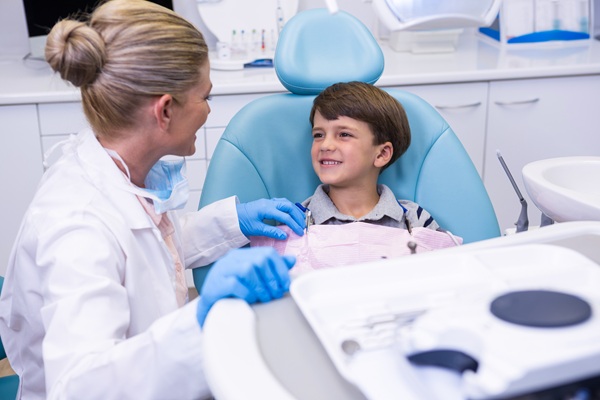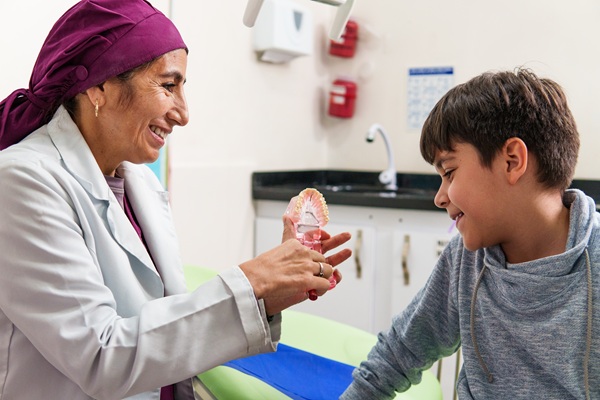Parent Guide to Infant Toothaches From a Pediatric Dentist

If you have an infant, you most likely know the importance of regular visits to the pediatric dentist. However, infants can still get toothaches, even with the right dental care. When this happens, you might not know right away that your child has a toothache. Knowing the signs of a toothache now can help you get your child the care that they need.
How to tell if an infant has a toothache
When children cannot talk, it can be difficult for parents to know when the child has a toothache. However, knowing what the symptoms are can help parents make an educated guess as to what is wrong. Constant pain in the tooth is one symptom. So if the child is constantly fussy, it should alert parents that something is wrong. Parents can gently touch the tooth to determine if it seems to cause pain for the baby. The jaw around the tooth may also be sore.
Most toothache pain worsens with cold or hot liquids. Parents can see if it helps to feed a baby room-temperature liquids instead of ones with temperature extremes. If the tooth decay has advanced, then the child may be showing signs of infection. This can include fever and general feelings of malaise.
Diagnosing a toothache
If a parent suspects a toothache in a child, the parent should take the baby to a pediatric dentist. If the pain is not caused by teething, then it is tooth decay that needs to be addressed. The bacteria from the infection can spread to other parts of the mouth or body. A pediatric dentist can diagnose the toothache.
At the appointment, the dentist will take a health history and examine the baby’s mouth. The infant may have X-rays done. This can help the pediatric dentist look at the internal tissues, such as the bone and the tooth’s root. The dentist may also use a transilluminator to look for cavities. This uses ultraviolet light but no radiation.
Treating toothache
The age of the infant and the severity of the toothache will determine how the toothache is treated. Generally, an infant will receive some form of antibiotics to kill harmful bacteria. This will prevent the infection from spreading. If the baby is very uncomfortable, the pediatric dentist may also recommend pain medication. This can help the baby sleep better at night.
To help kill bacteria in the mouth, the dentist may recommend a warm salt water rinse. However, if the infant is very young, a rinse may not be a good idea. If the child has a cavity, the dentist can remove the infected parts and fill this. The tooth will rarely be extracted.
Visit a pediatric dentist today
If your infant has a toothache, getting treatment sooner rather than later is good. An infection will not go away on its own. It can have serious consequences for your child. Visiting a pediatric dentist now can save your child’s tooth.
Request an appointment here: https://novapedsdentistry.com or call Nova Pediatric Dentistry at (201) 812-2952 for an appointment in our Dumont office.
Check out what others are saying about our services on Yelp: Read our Yelp reviews.
Recent Posts
A kid friendly dentist understands the importance of creating a welcoming and comfortable environment tailored to young patients' needs to help alleviate the child's stress or anxiety. Establishing positive dental experiences early on is not just about the present, but it also ensures children develop healthy oral hygiene habits that last a lifetime. Learn the…
Infants can benefit from seeing a pediatric dentist when primary teeth begin to erupt. Primary teeth are placeholders for permanent teeth and should receive the same attention, including appropriate home care.Primary teeth are crucial to a baby's health and development. Therefore, dentists encourage parents to begin an infant's oral hygiene routine as soon as possible…
Going to an emergency pediatric dentist can give your child immediate dental needs. Treating urgent dental issues can provide relief right away. It can also prevent complications. Here are the necessary steps that you can take even before the drive to your emergency pediatric dentist.Showing distress will only intensify the child’s anxiety. This will make…
Caring for kids' teeth is essential for their health and speech development. When a tooth becomes damaged, kids' dental crowns can help restore its function and protect it from further harm. In the past, dentists commonly used metal crowns for kids, but advancements in dentistry have introduced metal-free options. These modern crowns provide a natural…


